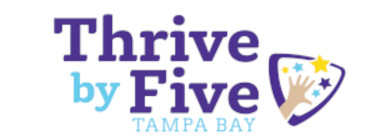READY FOR KINDERGARTEN.
READY TO TAKE ON THE WORLD.
Thrive by Five Tampa Bay is a cross-sector network dedicated to promoting the equitable development and lifelong success of children aged 0-5. We bring together caregivers, agencies, businesses, and civic officials to amplify and accelerate access to services and resources for families. Our focus is on the “whole child” ideology, encompassing their intellectual, physical, social, and emotional well-being.
Welcome to Thrive by Five Tampa Bay
We aim to raise awareness and meet children and families where they are, allocating resources and opportunities as needed to create equal outcomes for all community members.
Through collective impact and initiatives like Family Friendly Tampa Bay and Thrive by Five Connects, our resource and referral tool, we connect families to partner organization resources and work to fill gaps in access to services in Tampa Bay.
Ready for a Better Future, Ready for the World.
Impact
Partner Organizations in Hillsborough and Pinellas Counties
Families Connected to Services
Awarded Family Friendly Employers
Be Part of The Solution
Thrive by Five Tampa Bay is powered by people who care about giving children access to opportunities. It’s easy to get involved at any level. No experience is required. Your perspective and your voice are powerful all on their own.
Parents & Caregivers
Community Partners
Businesses
We can do this — together.
Thrive by Five fosters highly functioning countywide collaboration. We engage a wide-reaching network that proactively connects families and caregivers with the Tampa Bay’s many available resources.
To help serve our children and their parents and caregivers, our Vision and Leadership Councils work together to guide Thrive by Five’s strategy and efforts. We lean on a diverse set of stakeholders, partners, and subject matter experts who collaborate and help align resources across Tampa Bay.
Join our
cross-sector
network
Your support can make a significant difference in nurturing the potential of children aged 0-5 in our community. Fill out the form below to help us promote equitable development and access to vital resources. Let’s create a brighter future, one child at a time.
Learn More About Thrive by Five Tampa Bay
Complete the form below to connect and learn more about Thrive by Five Tampa Bay.
Setting children up for a strong start
A strong early childhood system ensures the youngest of Tampa Bay are ready to thrive in school — cognitively, physically, socially, and emotionally — by the time they reach kindergarten.
There is a significant and overwhelming volume of research and evidence showing over and over again that young children benefit from being in high-quality early childhood settings.
Over 90% of our lifetime’s brain development occurs from birth to the start of kindergarten, demonstrating the critical nature of this time period in a person’s life for building the foundation for skilled thinking, behaviors, and emotional well-being. It is in these vital foundational years that our youngest neighbors develop linguistic, cognitive, social, emotional, and regulatory skills that are linked to vital skills and functions later in life.
Unfortunately, too many young children from low-income and traditionally underserved communities do not have access to the settings and resources that will help them develop these skills to the maximum of their ability.
That’s where Thrive by Five Tampa Bay comes in.
📚✨ Florida`s School Readiness Program (SR) gives a boost to low-income families for early education, setting children on the path to future success in school. Administered by the Division of Early Learning (DEL) in partnership with local coalitions and organizations like Redlands Christian Migrant Association. #EarlyEducation #SchoolSuccess #FloridaFamilies
The Family Friendly Business Award® honors companies dedicated to supporting their employees and families. Ready to stand out as a leader in employee care? Apply now and make a difference in Tampa Bay! #FamilyFriendlyWorkplace #MakeADifference
Check out the following links for more information:
familyfriendlytampabay.org
tb5tp.org
🌟 #FloridaHealthyKids: Ensuring smiles and well-being! 🏥 Offering health and dental insurance for children ages 5-18. 👩⚕️ Governed by a diverse board of directors, including healthcare professionals, advocates, and state representatives. 💼 Proud partner of #FloridaKidCare, keeping our youth healthy and happy! #ChildHealth #DentalCare #InsuranceForKids
Empowering Exceptional Education: FDLRS Gulfcoast 🌟 A vital project of the Florida Department of Education, offering diagnostic, instructional, and tech support to district exceptional education programs and families of students with disabilities. Serving PINELLAS, PASCO, and HERNANDO Counties among eighteen statewide centers. #SpecialEducation #FDLRS #FloridaEducation
🌟 Empowering Little Minds, Building Bright Futures! 🌈✨ The Early Learning Coalition of Hillsborough County is committed to providing top-notch, inclusive early learning experiences for children aged 0-5. 🎓👶 Join us in shaping the next generation`s success through family, educator, and community collaboration! 💼👨👩👧👦 #EarlyLearning #InclusiveEducation #CommunityCollaboration
Calling all parents! 🌟 Searching for the best resources to support your journey? Look no further! Visit tb5tp.org to connect with the tools, guidance, and community you need to thrive as a parent. 🌱 #ParentResources #CommunitySupport #EmpoweredParenting #NavigateTogether #FindYourVillage #ParentingJourney
🌟 Nurturing Curiosity from Day One! 🧠💖 Quality early childhood programs empower little minds through hands-on learning and meaningful conversations. 🗣️ Building essential skills like self-control and sharing sets the stage for academic success. 🏫✨ Investing in high-quality early education not only benefits families but pays dividends for society, reducing costs and ensuring brighter futures! 🌐📚 #EarlyLearning #CuriosityInEducation #InvestInKids 🌈
🌱✨ Help Me Grow Florida: Empowering families with support, resources, and early detection for a thriving start! 🤝👨👩👧👦 Don`t navigate parenting alone—connect with a program designed to address your questions and concerns.
🌈🏥 #HelpMeGrowFlorida #FamilySupport #EarlyDetection #ParentingResources 🌟
https://helpmegrowfl.org/
👶📚 From "expecting" to "expert," the parenting journey is an adventure! 🌈 Navigating kindergarten readiness may seem like a winding path, but fear not! 🚀 Our community offers abundant support to ensure your little ones take confident steps toward a bright start. 🏫✨ #ParentingJourney #KindergartenReadiness #CommunitySupport #EarlyEducation 🍎
👨👩👧👦 Parenting is a journey with its ups and downs, but you`re not alone! 🌟 Thrive by Five Connects is here for Pinellas and Hillsborough families, offering support and resources for your little ones. Take a quick survey, and get a tailored list of services to help your family thrive! Link in Bio. 🚀 #ParentingJourney #ThriveByFive #FamilySupport #ChildDevelopment #CommunityConnection
Happy New Year from the Thrive By Five Tampa Bay network! 🎉🌟 As we step into a new year, we’re filled with hope and excitement for the endless possibilities that lie ahead. This year, let’s continue to champion the importance of the first five years of life, ensuring every child has the opportunity to grow, learn, and thrive.
May 2024 be a year of joy, discovery, and progress in the journey of early childhood development. Thank you for being a part of our community and for all you do to support the well-being and education of our youngest learners.
Here’s to a year of making a difference, one child at a time!
#HappyNewYear #ThriveByFive #NewBeginnings #EarlyChildhoodDevelopment #GrowthAndLearning #YearOfPossibilities #EducationalJourney #SupportingChildren #CommunityImpact #BrightFutureAhead
Teach your children about diverse holiday traditions from around the world. Explore stories, recipes, and activities that celebrate global holiday customs and bring the world`s festivities to your home.
Discovering new traditions is a wonderful way to educate and entertain during the holidays. Share a unique tradition you celebrate at home in the comments!
#HolidayTraditions #CulturalExploration #GlobalFestivities #FamilyLearning #WorldCultures #DecemberDelights #CulturalEducation #HolidayLearning #FestiveFun #DiverseCelebrations
Learn more Today
Have questions about early childhood education or our work? Fill out the form or contact us. We’re here to support and guide you in creating a brighter future for every child in Tampa Bay.


